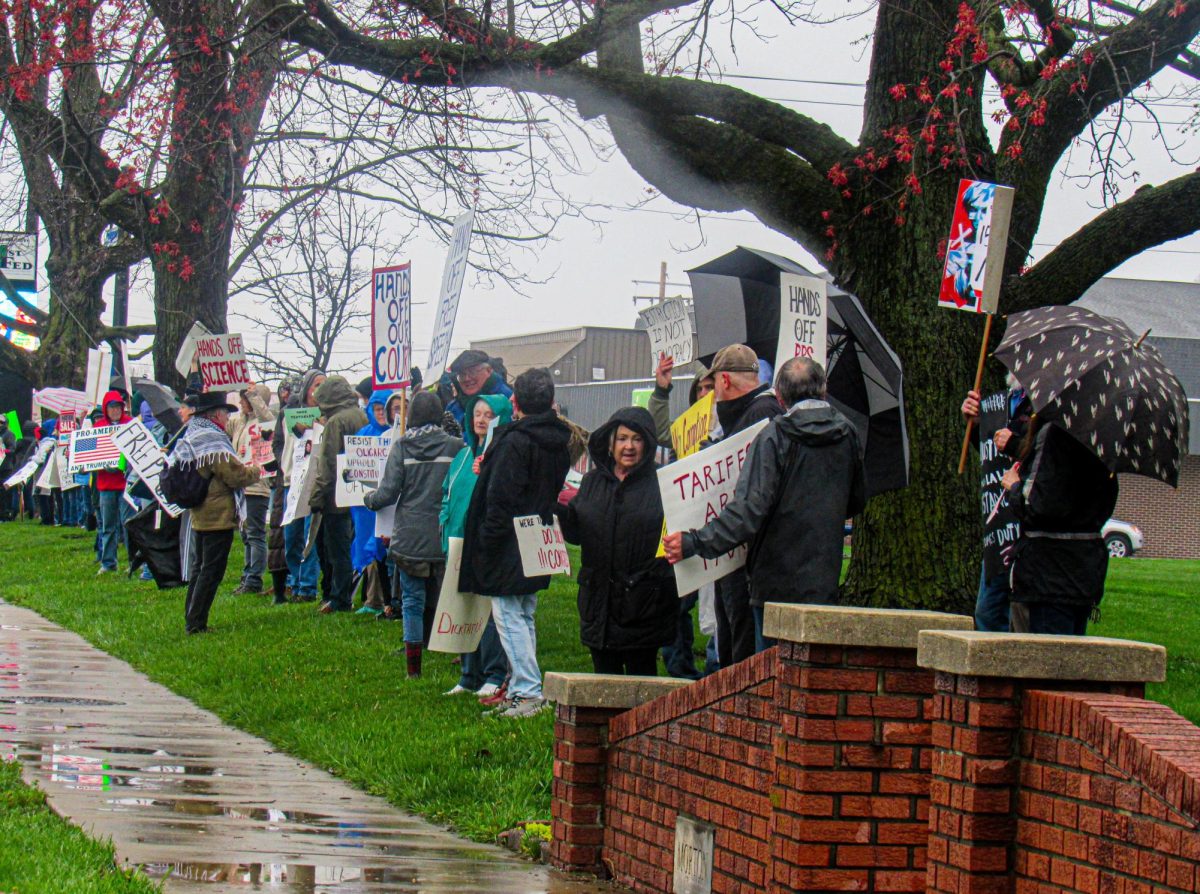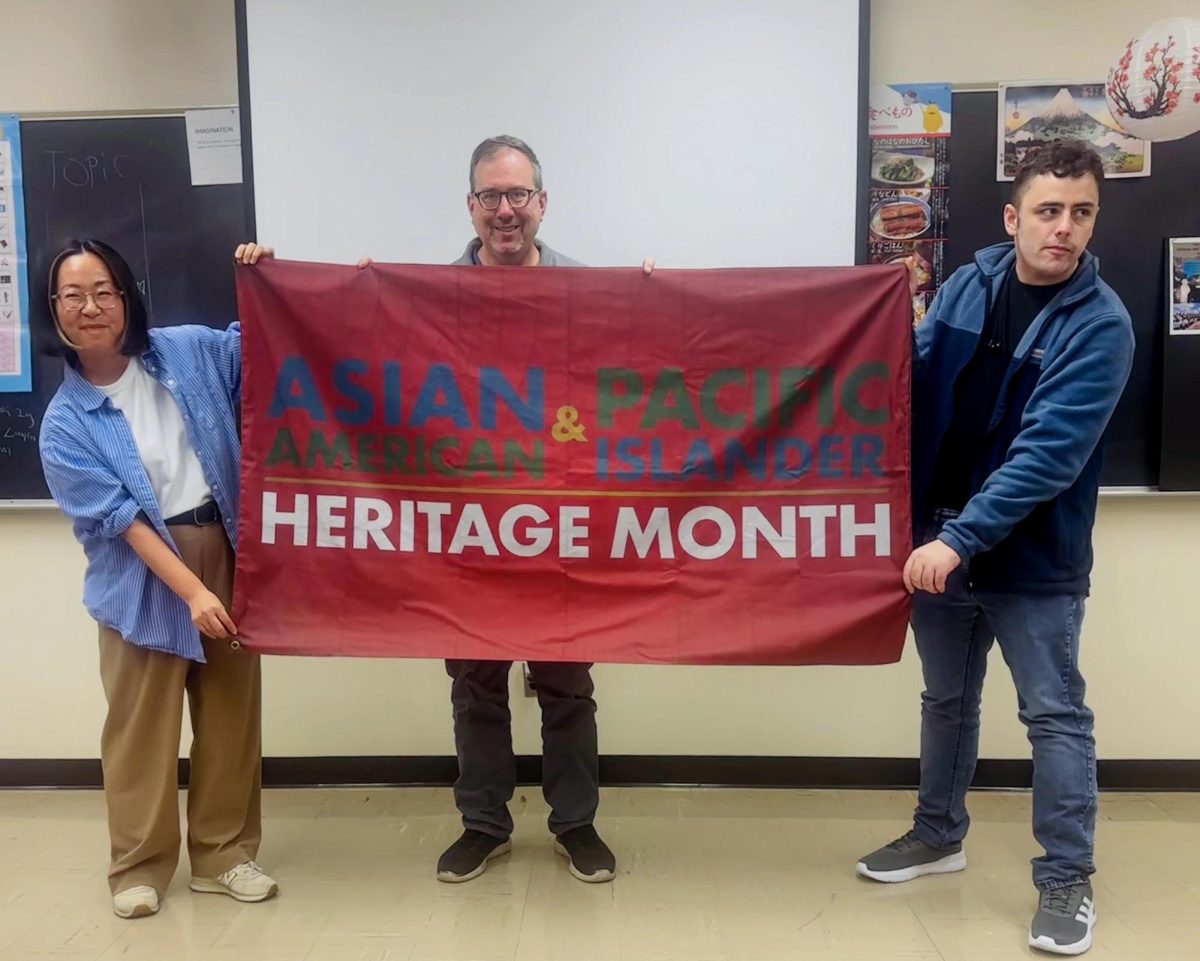Activist urges audience to speak out for peace, justice
A nationally-known human rights activist urged an audience of over 200 people to speak out for peace and justice Thursday night in Buzzard Auditorium.
Roy Bourgeois, founder and co-director of the School of Americas Watch, delivered a calm but passionate message to Eastern students, faculty, staff and community members explaining his views on what the School of Americas is and the reasons it should be shut down.
Ryan Hendrickson, political science professor, introduced Bourgeois, noting Bourgeois’ involvement in the United States military as a naval officer, his ordainment as a Catholic priest, his work with the poor in South America for the past 30 years and the four years he spent in prison for his involvement in non-violent protests against the SOA.
Bourgeois, originally from Louisiana, spent the first portion of his message detailing his past experiences that contributed to his current role as a human rights activist.
He said the violence, death and suffering in Vietnam changed him.
“Vietnam became a turning point,” he said. “For the first time I began to question this whole issue of violence.”
He said he then began to see hope in non-violence, adopting the peaceful philosophies of Muhatma Ghandi, Martin Luther King, Jr. and Dorothy Day.
After his military term ended, Bourgeois said he lived in a slum in Bolivia for five years.
“It was here in this slum that I was educated,” he said. “The poor I was there to serve became my teachers.”
He said it angered him to see the United States supporting a dictator there as a very small elite held the power and the poor struggled to survive.
The U.S. is exploiting the country, Bourgeois said.
“What has been put here (in Bolivia) for all to share and be good stewards of has ended up in the hands of a small few because of militarism, greed and power.”
After being forced out of the country, he said he returned to the United States where he learned of the injustice in El Salvador.
He said he and friends found in El Salvador a military at war with its people.
“What we also found was our own country giving guns and training to the soldiers who were doing that killing.”
In the U.S., Bourgeois and friends began to push for the SOA to be closed down.
He explained that the SOA originally opened in Panama in 1946 to train Latin American soldiers in combat skills such as commando tactics, military intelligence and psychological operations.
In 1984, former President of Panama Manuel Noriega called the SOA “a school for assassins,” and the school was kicked out of Panama, Bourgeois said.
The U.S. Department of Defense then reopened the school in Fort Benning, Ga., and the name has recently been changed to “Western Hemisphere Institute for Security Cooperation,” he said.
“It’s a new name, same shame,” he said. “It’s still about men with guns.”
Graduates of the school have been found to be responsible for the raping and murder of three U.S. nuns and a Catholic lay worker in El Salvador, the assassination of Archbishop Oscar Romero and the massacre of six Jesuit priests in El Salvador, among other atrocities, Bourgeois said.
“Some 12 dictators also went through this school.”
Bourgeois now organizes a non-violent protest outside the gates of the SOA in Georgia every year in November. Last year’s protest was attended by over 10,000 people from all over the country, he said.
“We go to Georgia to call for the closing of the school and to keep alive the memory of the victims.”
Half of those in attendance were college students, he said. Three members of the audience attended the protest, including Roy Lanham, campus minister of the Newman Catholic Center and Sean Barth, a junior philosophy major.
Barth stood to share his thoughts about the experience during the question and answer portion of the lecture.
He said people from Columbia were at the protest.
“It’s extremely powerful to have the wisdom soak into you from people who have direct experience with this stuff – people whose family members have been kidnapped,” he said. “Words really can’t describe the feeling you get to be in a group of people who really care.”
Bourgeois encouraged the crowd to come and be a part of the protest this November.
“Our foreign policy has been rooted in greed and exploitation,” he said. “We want it to be rooted in justice.”
Bourgeois advocated using U.S. dollars to build houses and schools and provide medicine for South American countries, rather than using the money for military training in the SOA.
“You don’t teach democracy through the barrel of a gun,” he said. “Send some of those students to American universities. By bringing them here, we can teach them skills that they can use to help their people and help improve the quality of life for their people.”
Bourgeois also encouraged the audience to write to congressmen to pass a bill that would close down the SOA.
“We realized we have to go to Congress to close the school,” he said.
An active duty member of the military stood to emphasize that point during the question and answer period .
“The U.S. military is subordinant to the civilian government,” he said. “Capitol Hill is the right place to start because we take our orders from them.”
He also asked if Bourgeois wanted to shut down other schools that train militaries from across the globe, including Europe and Asia.
Bourgeois responded that the military runs the South American countries whose soldiers are being trained in the SOA, and these militaries support their socioeconomic systems that oppress the poor and give power to the small, wealthy elite.
“The military should be subordinant to civilians,” he said. “If that’s being done there, bravo, we can support that.”
Bourgeois also briefly addressed the terrorist attacks of Sept. 11. He said he is fearful of government officials using words like, “retaliation, force, bombs and more killing.”
He closed the message by saying, “We want to bring peace to the world. We can’t do that unless there’s peace in our own hearts.”








![[THUMBNAIL EDITION] (From left to right) Head football coach Chris Wilkerson works with his son student assistant coach Peyton Wilkerson at football practice at O'Brien Field on the Eastern Illinois University campus on Thursday.](https://www.dailyeasternnews.com/wp-content/uploads/2025/04/FB_25_O-1-e1744234837107-1200x596.jpg)




![[Thumbnail Edition] Charleston High School sophomore Railyn Cox pitches the ball during Charleston's 8-7 win over Flora High School on Monday, March 31.](https://www.dailyeasternnews.com/wp-content/uploads/2025/04/SBHS_01_O-1-e1743982413843-1200x1023.jpg)



![[Thumbnail Edition] Senior Foward Macy McGlone, getsw the ball and gets the point during the first half of the game aginst Western Illinois University,, Eastern Illinois University Lost to Western Illinois University Thursday March 6 20205, 78-75 EIU lost making it the end of their season](https://www.dailyeasternnews.com/wp-content/uploads/2025/03/WBB_OVC_03_O-1-e1743361637111-1200x614.jpg)




















![[Thumbnail Edition] Eastern Illinois softball senior infielder Briana Gonzalez resetting in the batter's box after a pitch at Williams Field during Eastern’s first game against Southeast Missouri State as Eastern split the games as Eastern lost the first game 3-0 and won the second 8-5 on March 28.](https://www.dailyeasternnews.com/wp-content/uploads/2025/04/SBSEMO_11_O-1-e1743993806746-1200x692.jpg)















![The Weeklings lead guitarist John Merjave [Left] and guitarist Bob Burger [Right] perform "I Am the Walrus" at The Weeklings Beatles Bash concert in the Dvorak Concert Hall on Saturday.](https://www.dailyeasternnews.com/wp-content/uploads/2025/03/WL_01_O-1200x900.jpg)
















